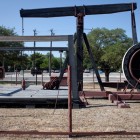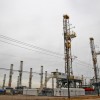Background
Oil was first detected in Texas in July of 1543 when Spanish explorer Luis de Moscoso of the DeSoto expedition saw oil floating on the water in the Galveston Bay in an area between High Island and the Sabine Pass, near Port Arthur, Texas. The first economically significant oil discovery in Texas did not happen for another 300 years.
In 1894, in Navarro County near Corsicana in East Texas, American Well and Prospecting Company discovered oil by accident in a field while looking for water. The J.S. Cullinan Company, later known as the Magnolia Petroleum Company, opened their refinery on the Corsicana oilfield in 1898. The field set the precedent for commercial oil production in the state, prompting further exploration of oil reserves in Texas.
The Corsicana oilfield discovery was monumental in bringing Texas into the national oil industry, but no discovery had as great an impact on Texas’ oil production than the discovery of oil at the Spindletop well located south of Beaumont. In 1902, Spindletop brought in over 17 million barrels of oil, dwarfing the 839,000 barrels the Corsicana field had produced by 1900. Within the year of its discovery, more than 500 Texas oil companies were operating at Spindletop. Some of these companies included Texaco, Gulf Oil Corporation, Magnolia Petroleum Company and Exxon, U.S.A. Success at Spindletop prompted oil companies to begin drilling along the Gulf Coast in search of similar results.
Throughout the next century, the Texas oil industry spread to the north, east and western parts of the state. Today, the Permian Basin dominates crude oil production. Texas is the leading crude oil-producer in the nation, accounting for 22 percent of crude oil production in the U.S. The oil industry is responsible for 1.8 million jobs in Texas and as of 2008, it brought in 9.9 billion dollars in taxes and royalties.
The Texas oil industry is not without its share of losses. In 2010, a failed blowout preventer on a BP deepwater rig in the Gulf of Mexico caused an explosion that led to the largest accidental release of oil into marine waters ever recorded. BP faced a lawsuit from the U.S. Department of Justice for economic and environmental damage.
Texas oil producers have also received criticism from environmental groups. In May 2011, the U.S. Fish and Wildlife Service proposed adding a dunes sagebrush lizard to the Endangered Species List. Oil companies argued that protecting the dunes to save the lizard would halt or significantly hinder oil production. At this time, ExxonMobil is entangled in a lawsuit with the Sierra Club and Environment Texas for violating the federal Clean Air Act at its Baytown oil refinery and chemical plant.







